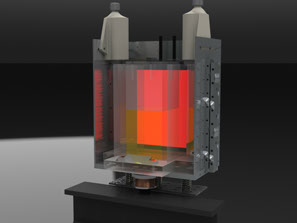
Accelerated test section

Tank and actuating system with voice coil and balance weights.
The Experimental Fluid Mechanics and Instability Laboratory
Aerospace and Mechanical Engineering Department at University of Arizona

Accelerated test section

Tank and actuating system with voice coil and balance weights.
The Experimental Fluid Mechanics and Instability Laboratory
Aerospace and Mechanical Engineering Department at University of Arizona